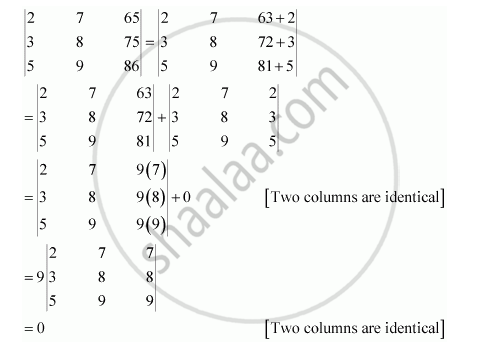Advertisements
Advertisements
प्रश्न
Using the property of determinants and without expanding, prove that:
`|(2,7,65),(3,8,75),(5,9,86)| = 0`
उत्तर

APPEARS IN
संबंधित प्रश्न
Using properties of determinants, prove that `|[2y,y-z-x,2y],[2z,2z,z-x-y],[x-y-z,2x,2x]|=(x+y+z)^3`
Using properties of determinants, prove that
`|[b+c,c+a,a+b],[q+r,r+p,p+q],[y+z,z+x,x+y]|=2|[a,b,c],[p,q,r],[x,y,z]|`
Using the property of determinants and without expanding, prove that:
`|(a-b,b-c,c-a),(b-c,c-a,a-b),(a-a,a-b,b-c)| = 0`
By using properties of determinants, show that:
`|(x+4,2x,2x),(2x,x+4,2x),(2x , 2x, x+4)| = (5x + 4)(4-x)^2`
Evaluate `|(1,x,y),(1,x+y,y),(1,x,x+y)|`
Using properties of determinants, prove that:
`|(x, x^2, 1+px^3),(y, y^2, 1+py^3),(z, z^2, 1+pz^2)|` = (1 + pxyz) (x – y) (y – z) (z – x), where p is any scalar.
Using properties of determinants, prove that:
`|(1+a^2-b^2, 2ab, -2b),(2ab, 1-a^2+b^2, 2a),(2b, -2a, 1-a^2-b^2)| = (1 + a^2 + b^2)^3`
Using properties of determinants, prove that:
`|[a^2 + 1, ab, ac], [ba, b^2 + 1, bc ], [ca, cb, c^2+1]| = a^2 + b^2 + c^2 + 1`
Solve the following equation: `|(x + 2, x + 6, x - 1),(x + 6, x - 1,x + 2),(x - 1, x + 2, x + 6)|` = 0
Without expanding determinants, prove that `|("a"_1, "b"_1, "c"_1),("a"_2, "b"_2, "c"_2),("a"_3, "b"_3, "c"_3)| = |("b"_1, "c"_1, "a"_1),("b"_2, "c"_2, "a"_2),("b"_3, "c"_3, "a"_3)| = |("c"_1, "a"_1, "b"_1),("c"_2, "a"_2, "b"_2),("c"_3, "a"_3, "b"_3)|`
Without expanding determinants, prove that `|(1, yz, y + z),(1, zx, z + x),(1, xy, x + y)| = |(1, x, x^2),(1, y, y^2),(1, z, z^2)|`.
Find the value (s) of x, if `|(1, 4, 20),(1, -2, -5),(1, 2x, 5x^2)|` = 0
Without expanding the determinants, show that `|(x"a", y"b", z"c"),("a"^2, "b"^2, "c"^2),(1, 1, 1)| = |(x, y, z),("a", "b", "c"),("bc", "ca", "ab")|`
Select the correct option from the given alternatives:
Which of the following is correct
Answer the following question:
Evaluate `|(2, 3, 5),(400, 600, 1000),(48, 47, 18)|` by using properties
Answer the following question:
Without expanding determinant show that
`|("b" + "c", "bc", "b"^2"c"^2),("c" + "a", "ca", "c"^2"a"^2),("a" + "b", "ab", "a"^2"b"^2)|` = 0
Answer the following question:
Without expanding determinant show that
`|(x"a", y"b", z"c"),("a"^2, "b"^2, "c"^2),(1, 1, 1)| = |(x, y, z),("a", "b", "c"),("bc", "ca", "ab")|`
The value of `|(1, 1, 1),(""^"n""C"_1, ""^("n" + 2)"C"_1, ""^("n" + 4)"C"_1),(""^"n""C"_2, ""^("n" + 2)"C"_2, ""^("n" + 4)"C"_2)|` is 8.
Evaluate: `|(x^2 - x + 1, x - 1),(x + 1, x + 1)|`
Evaluate: `|(3x, -x + y, -x + z),(x - y, 3y, z - y),(x - z, y - z, 3z)|`
Prove that: `|(y + z, z, y),(z, z + x, x),(y, x, x + y)|` = 4xyz
If `[(4 - x, 4 + x, 4 + x),(4 + x, 4 - x, 4 + x),(4 + x, 4 + x, 4 - x)]` = 0, then find values of x.
The determinant `|("b"^2 - "ab", "b" - "c", "bc" - "ac"),("ab" - "a"^2, "a" - "b", "b"^2 - "ab"),("bc" - "ac", "c" - "a", "ab" - "a"^2)|` equals ______.
If A, B and C are angles of a triangle, then the determinant `|(-1, cos"C", cos"B"),(cos"C", -1, cos"A"),(cos"B", cos"A", -1)|` is equal to ______.
If x, y, z ∈ R, then the value of determinant `|((2x^2 + 2^(-x))^2, (2^x - 2^(-x))^2, 1),((3^x + 3^(-x))^2, (3^x -3^(-x))^2, 1),((4^x + 4^(-x))^2, (4^x - 4^(-x))^2, 1)|` is equal to ______.
`|(x + 1, x + 2, x + "a"),(x + 2, x + 3, x + "b"),(x + 3, x + 4, x + "c")|` = 0, where a, b, c are in A.P.
The determinant `|(sin"A", cos"A", sin"A" + cos"B"),(sin"B", cos"A", sin"B" + cos"B"),(sin"C", cos"A", sin"C" + cos"B")|` is equal to zero.
The value of the determinant `abs ((alpha, beta, gamma),(alpha^2, beta^2, gamma^2),(beta + gamma, gamma + alpha, alpha + beta)) =` ____________.
Using properties of determinants `abs ((1, "a", "a"^2 - "bc"),(1, "b", "b"^2 - "ca"),(1, "c", "c"^2 - "ab")) =` ____________.
`f : {1, 2, 3) -> {4, 5}` is not a function, if it is defined by which of the following?
A number consists of two digits and the digit in the ten's place exceeds that in the unit's place by 5. If 5 times the sum of the digits be subtracted from the number, the digits of the number are reversed. Then the sum of digits of the number is:
Let 'A' be a square matrix of order 3 × 3, then |KA| is equal to:
Without expanding determinants find the value of `|(10, 57, 107),(12, 64, 124),(15, 78, 153)|`
Without expanding determinants, find the value of `|(10, 57, 107), (12, 64, 124), (15, 78, 153)|`
By using properties of determinants, prove that
`|(x+y, y+z, z+x),(z, x, y),(1, 1, 1)|` = 0
Without expanding the determinant, find the value of `|(10,57,107),(12,64,124),(15,78,153)|`
